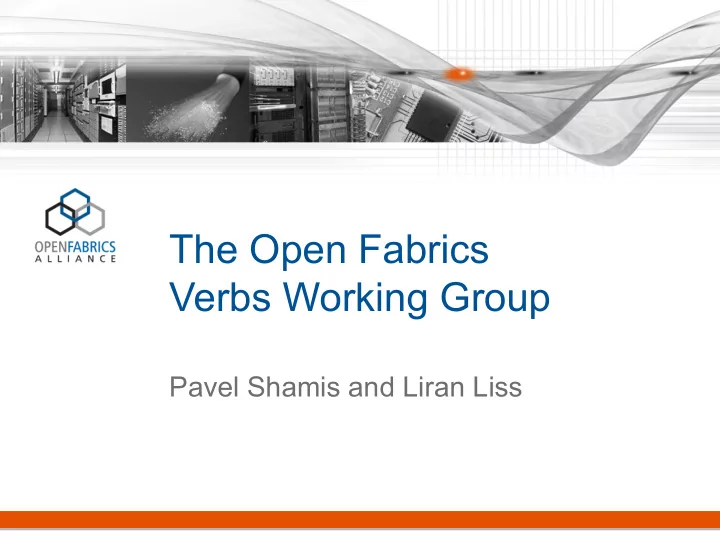

The Open Fabrics Verbs Working Group Pavel Shamis and Liran Liss
Introduction • Verbs is a high-performance mature and robust interface – Widely adopted – Stable – Scalable • Open-source development – Peer-reviewed code patches – Peer tested • Development rate and novelty constantly increasing – New applications and features – New systems and architectures • The Open Fabrics Verbs Working Group (OFV-WG) – Enhancing the verbs interface the meet the needs of future systems and applications 2
OFV Mission • Enhance the Verbs interface to meet the needs of future systems and applications – HPC, storage, cloud applications and more – CPUs, GPUs, and other compute elements – RDMA and other interconnect accelerated capabilities • Guide the development of the Verbs eco-system – Forum to discuss approach for new features – Raise community awareness – Partner with collaborators for introducing new features 3
The Verbs Eco-System Applica?on ¡ • Extended Verbs Middle-‑ware ¡and ¡ULPs ¡ – Enable new features RDMA ¡ RDMA ¡ DPDK ¡ Sockets ¡ RPC ¡ PMD ¡ • Infrastructure – Common services Verbs ¡Infrastructure ¡ – Common abstractions Scalable ¡SA ¡ RDMACM ¡ services ¡ • Middleware and ULPs Extended ¡Verbs ¡ – Application-facing APIs Vendor ¡ Extensions ¡ 4
The Verbs Eco-System: Extended Verbs • HPC optimizations • Signature operations – Accelerated Verbs • Extended atomics • Name space operations • Raw Ethernet support – QPNs, CQNs, MRs, etc. – Rx flow steering – Tx flow anti-spoofing • QP control – Stateless offloads – Suspend/resume – VLAN stripping – RSS, TSS – Tunneling (VXLAN, NVGRE) • Time stamp operations – Read HCA clock • Memory – Time stamp completions – Indirect Memory Regions 5
The Verbs Eco-System: Verbs Infrastructure • RDMACM improvements • Multi-rail bonding abstraction – E.g., APM support • Bulk address resolution • On-Demand-Paging for HPC • Container support • Kernel-managed user- space QPs • SELinux support – Connection management – fork() support • SoftRoCE 6
The Verbs Eco-System: Verbs Middleware • Group communication • Packet processing • Transaction-based IO • Java bindings – Efficient RPC • RDMA accelerators • Active messages – E.g., HPC, Hadoop, Ceph • RDMA sockets • User-space TCP/IP 7
Discuss New Approaches • Solicit feedback from a larger community and users – Not all of our contributors track kernel mailing lists – Storage, Big-Data, HPC, etc. • Discuss concepts before writing code or detailed [RFC] patches • Converge faster by interactive feedback – Faster acceptance • Tackle hard-to-crack concepts by focused discussions – Weekly increments 8
Community Awareness • Raise the need for important features – Introduce new use-cases – Describe feature requests – Aid in prioritizing the focus of the development community • Point out pain points and urgent issues – E.g., connection rate, “debugability” 9
Collaboration • Raise issues that you would like to work on • See if other community members are currently tackling the same issues • Establish collaboration to speed up development and increase efficiency • Cross-community collaboration – Discuss challenges with broader community 10
Summary • The pace of Verbs development is increasing • The user base of the Verbs Eco-system is expanding • The OFV WG will facilitate – Agreement on approach for new fronts • Faster acceptance and convergence – Prioritize and focus OFA development efforts – Encourage collaboration – Broaden the use of the interface – Increase adoption of RDMA technology 11
Thank You
Recommend
More recommend